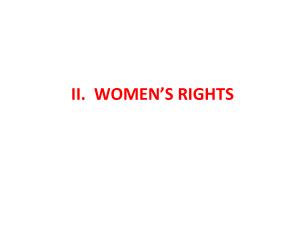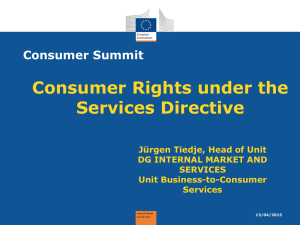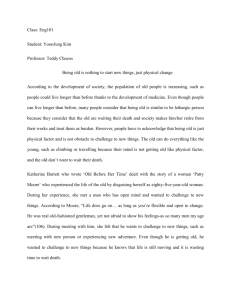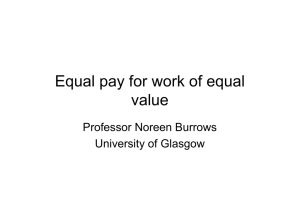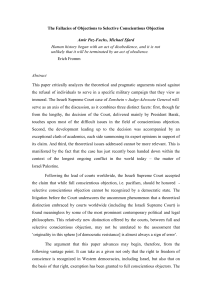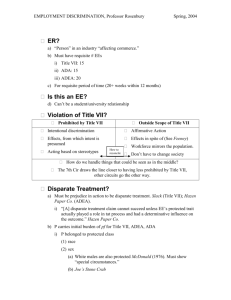Church and Nation Committee, Presbyterian Church of Victoria
advertisement
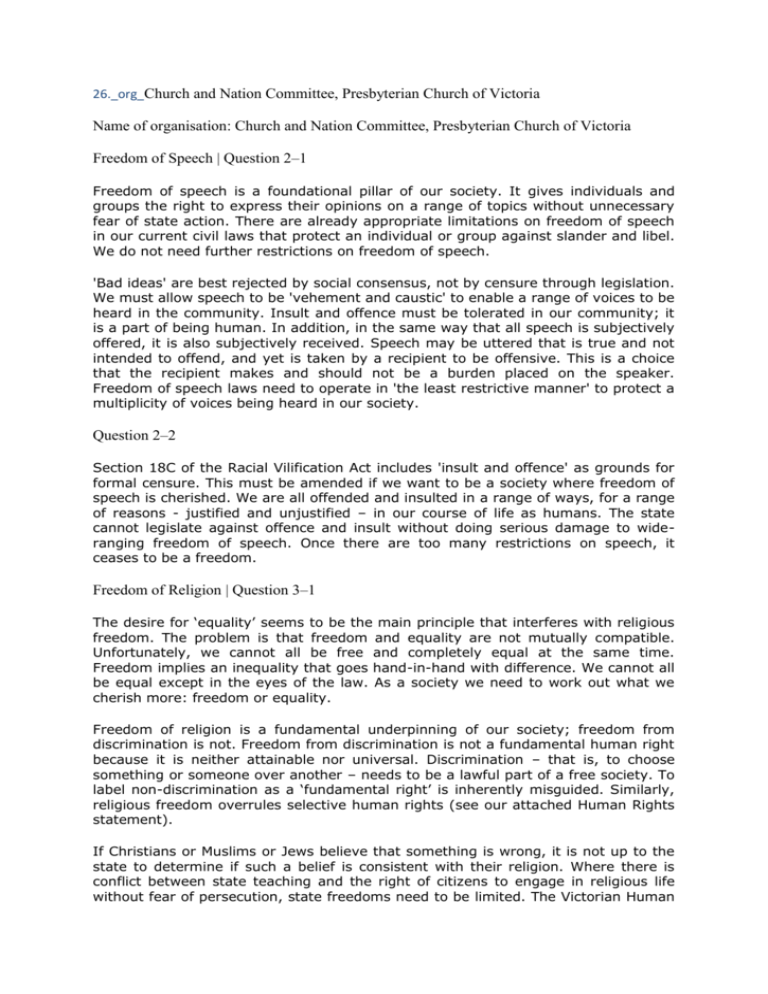
26._org_Church and Nation Committee, Presbyterian Church of Victoria Name of organisation: Church and Nation Committee, Presbyterian Church of Victoria Freedom of Speech | Question 2–1 Freedom of speech is a foundational pillar of our society. It gives individuals and groups the right to express their opinions on a range of topics without unnecessary fear of state action. There are already appropriate limitations on freedom of speech in our current civil laws that protect an individual or group against slander and libel. We do not need further restrictions on freedom of speech. 'Bad ideas' are best rejected by social consensus, not by censure through legislation. We must allow speech to be 'vehement and caustic' to enable a range of voices to be heard in the community. Insult and offence must be tolerated in our community; it is a part of being human. In addition, in the same way that all speech is subjectively offered, it is also subjectively received. Speech may be uttered that is true and not intended to offend, and yet is taken by a recipient to be offensive. This is a choice that the recipient makes and should not be a burden placed on the speaker. Freedom of speech laws need to operate in 'the least restrictive manner' to protect a multiplicity of voices being heard in our society. Question 2–2 Section 18C of the Racial Vilification Act includes 'insult and offence' as grounds for formal censure. This must be amended if we want to be a society where freedom of speech is cherished. We are all offended and insulted in a range of ways, for a range of reasons - justified and unjustified – in our course of life as humans. The state cannot legislate against offence and insult without doing serious damage to wideranging freedom of speech. Once there are too many restrictions on speech, it ceases to be a freedom. Freedom of Religion | Question 3–1 The desire for ‘equality’ seems to be the main principle that interferes with religious freedom. The problem is that freedom and equality are not mutually compatible. Unfortunately, we cannot all be free and completely equal at the same time. Freedom implies an inequality that goes hand-in-hand with difference. We cannot all be equal except in the eyes of the law. As a society we need to work out what we cherish more: freedom or equality. Freedom of religion is a fundamental underpinning of our society; freedom from discrimination is not. Freedom from discrimination is not a fundamental human right because it is neither attainable nor universal. Discrimination – that is, to choose something or someone over another – needs to be a lawful part of a free society. To label non-discrimination as a ‘fundamental right’ is inherently misguided. Similarly, religious freedom overrules selective human rights (see our attached Human Rights statement). If Christians or Muslims or Jews believe that something is wrong, it is not up to the state to determine if such a belief is consistent with their religion. Where there is conflict between state teaching and the right of citizens to engage in religious life without fear of persecution, state freedoms need to be limited. The Victorian Human Rights Commission states that, 'The right to freedom of religious belief does not confer the right on members of a religion to impose their beliefs on a secular society.' Yet, similarly, a so-called ‘secular’ state does not have the right to impose beliefs upon others when they unduly impinge on issues of religious belief or conscience. Question 3–2 Victoria's abortion laws regarding the conscientious objection of medical professionals are an example of a law that unjustifiably interferes with freedom of religion. Workers in any area should have the right to abstain from engaging in tasks that adversely impact their religious beliefs or conscience; they should not be penalised for it. Such claims of adverse impact should not have to be decided on by a statutory authority or imposed from above. The example at section 3.25 which uses conscientious objection to abortion as an example of 'where one person's religious observance may cause harm to another person' is completely misguided. It implies that not having an abortion is a form of harm - a particularly nonsensical idea, given that an abortion kills a human person and scars its mother. A doctor’s conscientious objection to performing an abortion is a more fundamental right than woman’s choice to terminate her child, especially since there are doctors who do not object to performing abortions. Freedom of Association | Question 4–1 Freedom of association should only be limited when plots to commit an actual crime are detected. Question 4–2 Freedom of Movement | Question 5–1 Freedom of movement should only be limited if a plot to commit an actual crime is detected. Question 5–2 Property Rights | Question 6–1 Question 6–2 Retrospective Laws | Question 7–1 Question 7–2 Fair Trial | Question 8–1 Question 8–2 Burden of Proof | Question 9–1 As a general rule, the person bringing a claim of wrongdoing against another person should bear the burden of proof, as it currently operates in criminal law. Otherwise, trivial claims designed to do maximum harm to the accused mean that the process becomes the punishment, regardless of an end verdict of guilt or innocence. Question 9–2 Anti-discrimination laws such as the Sex Discrimination Act 1984, Section 7C states that, 'the burden of proving that an act does not constitute discrimination because of section 7B lies on the person who did the act.' There are several issues with this approach. Firstly, the person accused of discrimination is called ‘the discriminator’ i.e. the title itself proceeds from an assumption of guilt rather than innocence. Secondly, the alleged discriminator must prove – in the first instance – that s/he did not discriminate. This is a reversal of the procedure in criminal law where the burden of proof rests on the prosecution to 'make a case' that the defendant committed the act. The alleged discriminator should not have to prove - in the first instance - that they did not commit the act. The burden of proof should rest on the person bringing the claim of discrimination. Otherwise - as has been the case - the process itself becomes the punishment and vexatious litigation ensues. Privilege against Self-incrimination | Question 10–1 Question 10–2 Client Legal Privilege | Question 11–1 Question 11–2 Strict and Absolute Liability | Question 12–1 Question 12–2 Appeal from Acquittal | Question 13–1 Question 13–2 Procedural Fairness | Question 14–1 Under Procedural Fairness 14.8, it states that, 'The bias rule of procedural fairness requires that a decision-maker must not be biased (actual bias) or be seen by an informed observer to be biased in any way (apprehended or ostensible bias)'. It appears to people of faith that often the arbiter of decisions involving church and state is not able to be unbiased because they either hold to or object to (or at least abstain from) the faith position of the person or organisation involved. For example, an atheist judge makes a ruling on what is or isn't an essential tenet of a particular faith. For example, in Cobaw vs. Christian Youth Camps Ltd, the judges involved were asked to give a ruling on what was or was not a 'core doctrine' of a particular faith, and whether conformity with that doctrine was 'required' or 'compulsory.' How this was procedurally 'fair' is hard to fathom. Question 14–2 Delegating Legislative Power | Question 15–1 Question 15–2 Authorising what would otherwise be a Tort | Question 16–1 Question 16–2 Executive Immunities | Question 17–1 Question 17–2 Judicial Review | Question 18–1 Question 18–2 Others Rights, Freedoms and Privilege | Question 19–1 Other comments?

